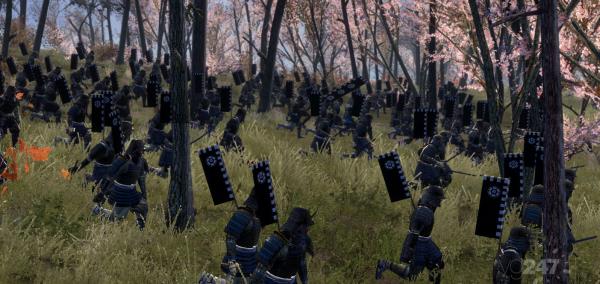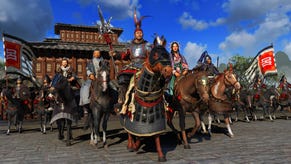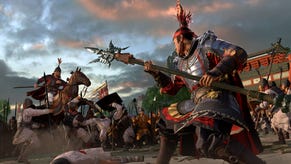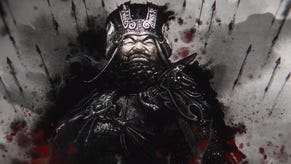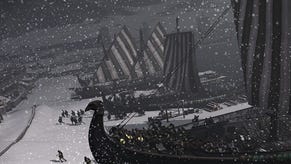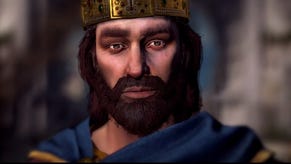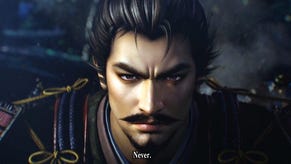Talking About Total War With Mike Simpson
The subtitle that became the name of an entire series has finally been given its rightful place. The next Total War game will be called Total War: Shogun 2, and that's the game I talked about with The Creative Assembly's studio boss, Mike Simpson. We didn't stop there, of course, because the conversation had to turn to Empire, Napoleon, problems with AI, the nature of multiplayer gaming on the PC, and the possibility of Total War: The 20th Century. So read on for some perspective from the strategy supremos of Sussex.
RPS: So when I last visited you guys, before the release of Empire, there was this feeling that because you had developed firearms, and cover, and vehicles in the form of ships, that maybe you'd be heading towards announcing something along the lines of a 20th century Total War game... but instead it's a return to Shogun? Was it always going to be Shogun? Or did something change?
Simpson: Okay, well, the way we look at it is that there is a long list of things we can do with Total War, and I should think that almost anything you've ever thought of is on that list. We argue constantly about the things on that list, and the order in which we're going to do them. The order changes all the time. The 20th century is on the list, but of course it's not exactly the easiest transition from the kinds of battles that Empire was all about, which was all about formal armies and men moving around in units. The 20th century is much more fragmented, much larger battlefields, and there's just more to deal with: aircraft, and so on. It's certainly something we want and intend to tackle one day, but it wasn't the thing we most wanted to do after Empire. What we really wanted to do was go back and redo Shogun.
RPS: Can you explain a bit about that then? What sort of process lead to that? Why is Shogun so appealing?
Simpson: So we talk about this list, and we discuss the things on there all the time. Shogun had been at the head of the list for quite a while. There are a few reasons for that, and the main one is that it's just a setting that has everything we need to make a really good Total War game. It has the cool content, which was the thing that we fell in love with the first time around. We still really like the Japanese content because its perfect for a strategy game. It's a period in history where there were a lot of different factions that could have won, and in the end it was one of the smallest and least likely factions that ended up dominating, ruling Japan, and founding a dynasty that would run for the next two hundred years. It's got that perfect starting position of beginning with a small amount of territory and being able to expand enormously. The other thing is that it was a period of rapid technological change. For instance, the introduction of gunpowder into Japan brings guns and creates a tech race. So the setting has everything we need, the content we need, but there's also so much we can do now with the game's technology that we couldn't do before. That just made us want to go back to it.
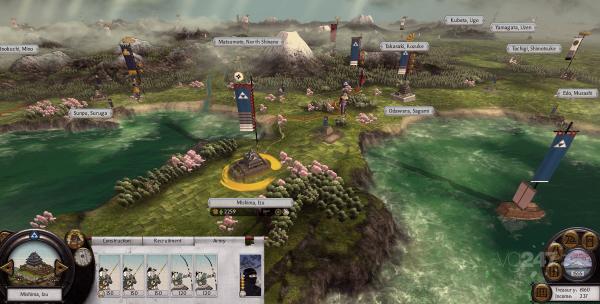
RPS: So there's some extremely shiny things been revealed with regards to the campaign map and so on, but I understand one of your major concerns this time is developing multiplayer and making that into more of a mature, ongoing experience? What's your approach?
Simpson: In the past our multiplayer has consisted of stand-alone battles, which take a while to set up. And there's ultimately nothing much to make your care about the result in the long run, they are one-off events. Traditionally our multiplayer has only been a fraction of the gameplay of the main game, of course, and so we wanted to think about that and serve up a multiplayer game that was more like other multiplayer PC games in general. PC multiplayer is generally quite strong, and so we wanted to get more of the people who would play our single player involved and playing our multiplayer – that's the objective. We tackled this from a number of directions, one of which is just to focus on the battlefield gameplay, so that the battles are strong enough to stand up on their own merits in the long run, so that playing battle after battle remains a strong experience. But the other angle is to put a wrapper around these battles to give the game a long-term meta-game, and we did that in a variety of ways, and there's a lot of it.
RPS: Progression? Unlocks?
Simpson: Well people have commented that it's rather similar to how Call Of Duty's multiplayer rewards work, although I happen to know that our design team haven't actually ever played Call Of Duty.
RPS: Parallel development, eh?
Simpson: Well they're solving very similar problems: how to put an interesting wrapper around a series of short bursts of gameplay. In this kind of multiplayer you've got to do it in a way that doesn't mean that veterans necessarily always kill the newbies, so there's a real limit on how much progression you can allow in terms of power. You can unlock a variety of tactics and so on, but not become more powerful overall.

RPS: It's an interesting point, because multiplayer tends to be much more about the ruleset – how tightly the game plays, which has always seemed to be what the North American strategy studios obsess over. Total War on the other hand has always seemed more open and rough, the model is more exploratory, more sprawling, figuring out how best to bodge it, rather than executing a super tight build-attack process.... a different philosophy.
Simpson: Yes, there's a fundamental difference in philosophy there. It's the difference between creating a game where the player is playing against a specific set of game rules, where the rules are carefully crafted and therefore limited, and what we are trying to do. What we are doing is trying to get the player into what might be a real world situation. Our games are more sim-like than “gamey” in terms of the way the rules work. Now, as it happens, those things don't conflict because we are simulating historical warfare. Almost anywhere in history you can look at warfare and find a set of rules that are almost perfectly balanced, because they've evolved to get there. Our philosophy is one where we try to make it like the real world because we know that the real world already had good gameplay in it. Rather than going directly to a set of arbitrary rules, we base it on the real world. That has an extra advantage for us in that things that ought to work in the real world tend to work in game. If you have an idea of how battlefields in the real world work, things like flanking, attacking from behind, using terrain, that will work for you in the game.
RPS: Ah, but that doesn't always work in your favour, does it? The emphasis of criticism of the last couple of games has often been on the AI, and that seems to be precisely because people have some understanding how things work in real battlefields, they get upset when it doesn't work like that in the game. They do get cross about that, particularly with Empire. It was a really big deal this time around.
Simpson: That's true, if you don't do a good enough job, and I think that's what we were possibly guilty of with the last game. When we moved into the Empire-Napoleon sort of era it was the case that the way the AI needed to work was radically different from the previous games. I think we underestimated how radical that difference was. When you are forming up with these long lines of soldiers it's all about fields of fire and moving into positions to dominate the battlefield. It took us a lot of work, and a lot of patches, to get that working correctly. Going back to the Shogun era, we have a much more balanced mix of ranged combat and melee, we're back to an area where the AI was already very good, and we've been able to build on that, and we're not doing any of the kinds of things that were an issue previously. That's on the battlefield, of course, on the campaign side there are a different set of problems. Part of that is related to the structure of the game. In Empire and Napoleon you start off with quite a big Empire, and that changes how things play out. We had introduced an entirely new campaign AI for that game, and it was very, very ambitious, and it took us quite a long time to get it to do quite what wanted it, and it was quite a chaotic process. To give an example of the kind of problem we faced: if you were playing against AI on a very high difficulty level in Empire or Napoleon, then you wanted a serious challenge, you wanted to be attacked. The campaign AI wasn't aggressive enough for most people, it was passive, that problem has gone for Shogun 2, and the very hard and hard levels have beaten me already in testing. There is so much AI grunt that I think we are now dialing that back, which is a better position to be in. I don't expect to get any of that kind of criticism of the AI in Shogun.

RPS: Napoleon seems to have been relatively well received as a smaller campaign, which I think has been true of a couple of the smaller games. Yet they seem secondary to the roadmap. Your focus is very much the grand campaign, and then something else. Is that something you ever consider changing?
Simpson: That's another of the reasons to go back to Shogun. It's all set in Japan, so it's somewhat less sprawling that something like Empire was. Empire by its nature had to encompass two thirds of the world, and that made it very big and complex right from the start. What I like about Shogun is that you start with a single region. The map is still very large, so it doesn't have an epic field, but it's not overwhelming at the beginning in the same way that Empire could be.
RPS: Naval battles again? Were they really significant to the struggle for Japan?
Simpson: Yes, we have have naval battles again, but they're interesting because they're so different from European naval conflict we did in Empire. A lot about them helps gameplay a lot, too. With Empire period battles the side with the biggest ships and the most guns would generally win, and that's not a great thing for gameplay, or to get any kind of stone, paper, scissors relationship with. For Japanese naval battles it's a lot more like a land battle. There will be a variety of bow ships or missile ships, whose job is to shoot things at range, and then there are melee ships who tackle and board other ships, and then there were gunships later, too, with the arrival of firearms. So there's more variety. They were also mostly oar-powered, too, so there's not this problem of constantly being in motion against the wind, which ultimately made it much harder to control more than just a few ships in Empire. We also mixed land into the naval battles too – these are coastal battles, because the Japanese battles did not venture into the deep sea - so there are things like small islands and straights to use. The naval battles in Shogun are fun and interesting.
RPS: I have an odd tangent for the next question, because it's a question that seems to have become obligatory for big PC games companies: what do you feel about free-to-play models for gaming? Is there anything there for you?
Simpson: It's something we are thinking about all the time, because it's interesting. I think what Facebook games in particular have revealed is that there is a whole area of game design which is just about making your game spread itself virally from person to person. The Facebook games are entirely based on links between people. They are designed to get you to want your friends to play because that gives you some advantage. That's an interesting idea, especially when you are thinking about how to create multiplayer games. I don't see any reasons why some of the distinctions between single and multiplayer couldn't be blurred a bit, too. That idea seems to have sprung out of free to play. Whether we will end up in that sort of area I don't know. It's interesting to think about, but as far as our own work and Total War goes... I don't have an opinion yet.
RPS: Returning to multiplayer, how do you feel the co-op campaign for Empire was received? Were you happy with it?
Simpson: It's not something that vast numbers of people want to do. We're going to carry on supporting it, and we'll develop the concept as we go along. I think there's more that we can do to get people to play campaign-like games co-operatively, or co-operatively against other groups. There are obviously difficulties playing the straight Total War campaign game with any large number of players. It can take years to take it turn by turn and to play out all the battles, certainly with the way things are arranged at the moment.
RPS: Speed chess sort of arrangements?
Simpson: Yes, we have those sort of things in there now. It moves them along!
RPS: I have to admit I never go around to looking at it. Seemed too daunting even to get one other player involved after the Empire campaign. Constantly managing RPS and my other projects means I generally want to tackle something I can digest in my own time...
Simpson: Yes, quite. The fans have been asking for this, the co-op campaign, for a long time, and they say “we want 8v8 campaigns” and we say “no, you really don't.” You'd try to play that and you'd never get to a full turn because someone would be out doing something else. It'd be rubbish. Anything beyond 1v1 or two versus the AI becomes very complicated. But we'll work on that in the future. It's one of those things on the list!
RPS: Thanks for your time.
